Coming Officer’s Foreword North Camp, Ripon, 29/12/17
I have been asked to write a “Foreword” to a history which is to appear in the “Dundee Advertiser” of “The 6th Black Watch” – Perthshire’s Own Battalion of the Royal Highlanders.
Little did I think when I handed over the command of the 6th Black Watch in 1910 to the late Lieut. Colonel Campbell, after being its O.C. for 28 years, that I would have the good fortune to be recalled to take command of the old Battalion again, but that proud moment arrived on the 16th September 1914, and on that date, the honour was granted me to serve again with many old comrades.
Recruits were pouring in, and before many weeks had passed the Battalion was over its strength, and a finer body of men no Commanding Officer ever had the privilege to command; and from May 1st 1915, when the Battalion arrived at Bedford for overseas, up to now its record has been the pride of all Perthshire. I wish I were allowed to quote from congratulatory messages which have been received by the Commanding Officers who have had the honour to command the Battalion, but it is sufficient to say that the boys in the many attacks they have made have always accomplished whatever they have had allocated to them; and long may the same esprit de corps and pride for the Red Hackle continue that has always existed in this grand Territorial Battalion.
In conclusion, may the Battalion’s good luck remain with it, and may the boys ere long have a victorious return, is my heartfelt wish.
God bless them.
Sir Robt. D Moncrieffe
The following written from the diary of Colonel J Wylie, Perth, supplemented by details supplied by Sergt Major W Smitton, Auchterarder; Sergt. Davidson, Perth; Pte. Peter Wylie, Crieff; and many others who went out with the Sixth, and were with it in all its important engagements.
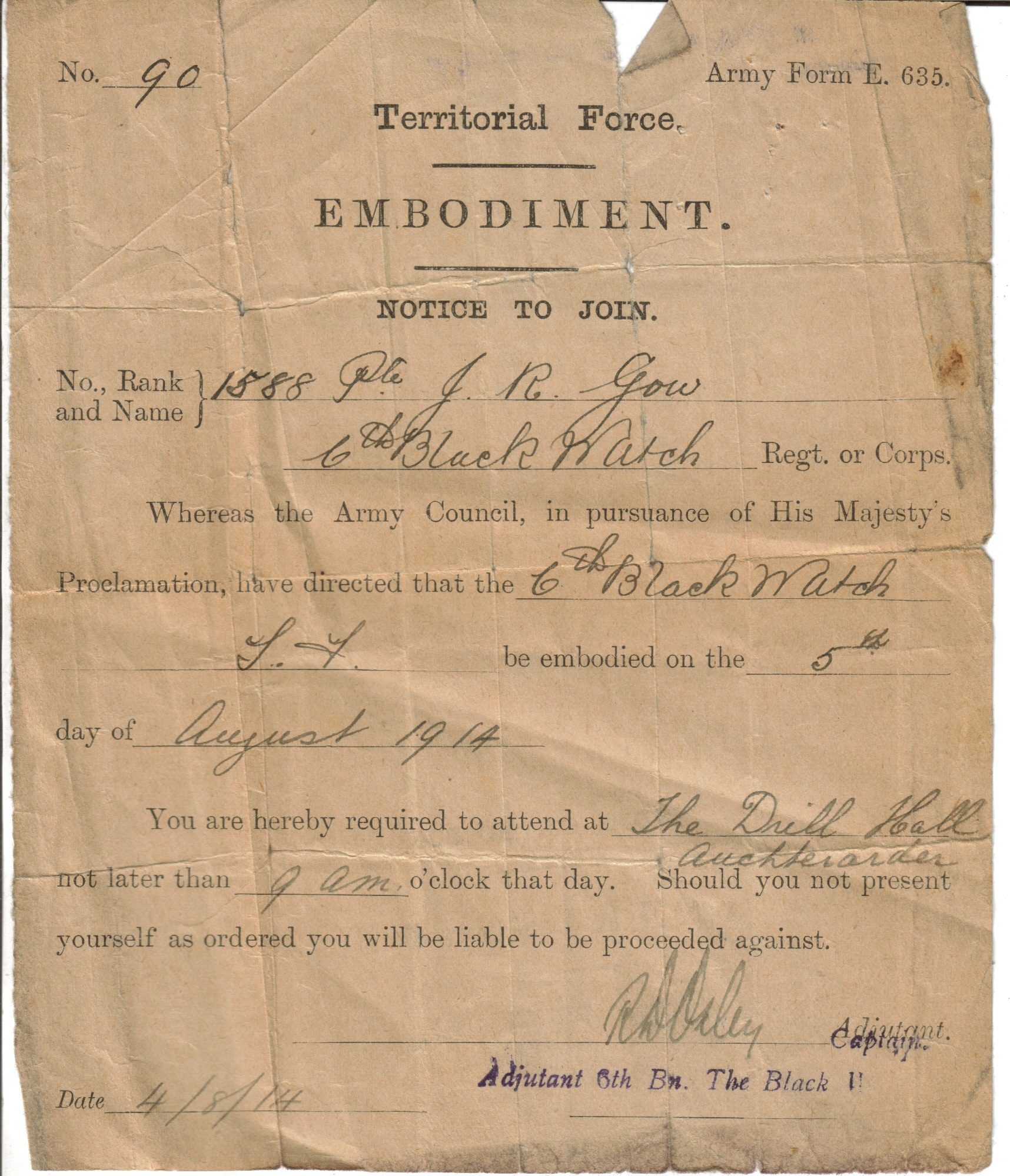
Training
The outbreak of war and the immediate mobilization of the Territorials created nowhere greater enthusiasm than among the men of the Sixth Black Watch. The neighbourhood of the Drill Hall in Tay Street, Perth, on the first few days following the historic 4th August 1914 was the scene of the liveliest excitement. But the mustering of the battalion was carried through with great smoothness and rapidity. The men had been given instructions what to do in case of mobilization, and prompt to the call they flocked in from every part of the wide country, all asking the same eager questions – “What are we to do? Where are we going?”.
John Wylie left Perth for Aberfeldy on the 9 30 a.m. train on Wednesday 5th August with James Young, from whom he borrowed a revolver. He reached Aberfeldy and found Sergeant Wilkie packing rifles and kits. He made a nominal roll and had lunch at the Station Hotel with Major Scott. Then got his hair cut and made a few small purchases to complete his outfit. The men began rolling in. They were medically inspected by Dr Mackay (Surgeon Colonel) and given identity discs etc. The Company fell in at 4 30 pm and were addressed by Provost Haggart, who also provided a box of biscuits for the men. They received a tremendous oration on arriving in Perth. After a long wait in Perth, they left about 8 15 p.m. accompanied by a retired Military Officer very keen to have a hand in the show. They reached Carlingnose about 9 30 p.m. Capt. Wylie got the men rigged out with blankets etc and finally turned in , with Capt’s Pullar and Young about midnight.
Here the Battalion was joined by two detachments, one from Belfast and another from Dublin. It is of interest to record that this Battalion of Highland soldiers had well-organised detachments in Ireland in 1914, and that these joined with the same enthusiasm as did the men of Perthshire.
Headquarters of the Battalion occupied the Golf Club House near Carlingnose, and the eight companies were detached over a large area. The Battalion was commanded by Lieutenant Colonel C. E. Colville, in the absence, through illness, of Lieutenant Colonel D.C. Campbell, wh owas never able to join the Battalion, but died in the autumn of 1914, to the deep regret of his many friends in the regiment.
The companies were commanded as follows :-
A company (Perth), Captain A. Innes
B “ (Perth), Captain G. D. Pullar.
C “ (Dunblane), Major C. Murray-Stewart
D “ (Crieff), Captain L. Gibson
E “ (Blairgowrie), Captain W”. Alexander
F “ (Auchterarder), Captain T.E. Young
G “ (Dunkeld and Pitlochry), Captain R. G. Gordon
H “ (Aberfeldy), Captain J. Wylie
The Adjutant was Captain J. W. Oxley, Gordon Highlanders, and the Quartermaster an ex regular of the Black Watch, Major B. Sadler. The Regimental Sergeant Major, Sergeant Major J. Wilson – better known among his countless friends as “Punch” – had also served with The Black Watch.
On the first day there the war spirit everywhere prevailing had a dramatic expression in a sudden outburst of big gun firing in the Forth. The sound created great excitement in camp. What was happening? Was a German squadron already attempting an attack on the Forth Bridge.
It was only an inoffensive cargo steamer, which, in ignorance of the restriction newly imposed, had ignored the signals to stop for examination, and had been brought up by gun fire. The occurrence became an ordinary one later on; but to the men of the Sixth, imbued with the fighting spirit and keenly alive to the possibilities of the times, it was an exciting one. Those warning shots from the Queensferry forts were the first they had heard fired in the war.
About a fortnight after mobilization, Sir Robert Moncrieffe was reappointed to command the Battalion vice Lieutenant Colonel Campbell. Sir Robert had commanded it for eighteen years – from 1893 to 1911 – when he had brought the Battalion to a state of high efficiency. The greatest enthusiasm was shown by officers and men when he came back to take over command at Queensferry.
Shortly after this a second line Battalion was formed under the command of Colonel A.W. Hay-Drummond. This unit, composed mainly of men not then considered fit for service overseas, took over the defences on the south side of the Forth. This enabled the 1/6th to devote more time to training the large number of recruits now flowing into the Battalion.
One of the duties fulfilled by the Sixth was the patrolling of the Fife coast, which had been undertaken by a special service section, called up as early as 25th July, under Capt J Halley. There is little doubt that the keenness of the men, and the shrewdness with which they tackled the work almost, if not completely, stopped the activities of the enemy agents who, in anticipation of the outbreak of the war, had established themselves around Rosyth and the upper reaches of the Forth. A “spy hunt” was a matter of frequent occurrence, and a rifle shot at night, was the signal for general turnout, followed by a chase after some illusive figure that had been swallowed up by the darkness. The station was the scene of a great hunt one night, and amid much excitement the premises and the houses in the neighbourhood were all carefully searched, but if it was a spy that had alarmed the sentry, he managed to make good his escape.
Social pleasures of various kinds were enjoyed at Queensferry. The men remember with particular gratitude the kindness of the Rev. Mr Fraser, whose house was open to them every night. It was a sort of Club, where they could right or have music, etc. It may interest the reverend gentleman to know that the men of the Sixth have not forgotten his many acts of kindness towards them.
A very amusing incident occurred at a social meeting at which the Perth lads were present. One of the speakers, forgetting his environment, and got carried away by his theme, dwelt at great length upon the duty of ever man to join the army. The men of the Sixth had “stuck” about 15 minutes of this, when a wag at the back of the hall (near the door!) got up and shouted, “Who’s for the army?”. In the laughter that followed the speaker gracefully retired.
The men by this time had begun to consider their training completed, and regarded it as a gross injustice that they should be kept on guard duty when they were fit for foreign service.
The following song was sung on every available occasion as a broad hint to the Colonel to “raise Cain” at the War Office and get the Sixth sent across the Channel :-
Come all you jolly fell-i-ows And listen to my song; It’s about the Sixth Black Watch, To which we all belong. We’re stationed at the Queensferree, Beneath the old Forth Bridge, And for all the horrors of war prepared On stew and porr-i-idge.
There’s one thing I must men-shi-en, It’s what we want to know – That’s when we’re bound for foreign parts To meet the blooming foe? We’re tired of guarding railway lines, Parades we all detest, And our only consola-shi-on is, The Colonel’s doin’ his best.
The song was composed by the bard of the battalion, Pte. Nisbet (died of wounds 16th July 1915), and was sung to the tune of the ditty that recounts the history of the “good ship Calabar,” which came to an untimely end as the result of having “struck agin’ a lump of coal that wasn’t marked down in the chart.”
Mounting guard on the Forth Bridge and patrolling the Queensferry Tunnel were dreary jobs, however, especially at night time, and there was little regret among the men when the battalion received orders to move. Headquarters had just been established at a big house at St Margarets, in a fine situation overlooking Rosyth, and the Staff had put everything in order, with the expectation of passing the winter there, when the order came that the Sixth were going to Dundee.


The first fatality suffered by the 6th Battalion was Pte Hugh Paterson, killed by a train on the south side of the bridge while serving with the 2nd battalion 6th Black Watch. Remembered on the Pitlochry War Memorial. His family were living in Kenmore Street, Aberfeldy at the time.
From many points of view it turned out to be a very acceptable change. The battalion arrived in the Tayside city in the beginning of November, and took up quarters in the old Western Poorhouse, which had been vacated by the Parish Council for conversion into barracks. The buildings were commodious enough, and stood in grounds which afforded ample room for recreation; but the men were not long settled down before it was discovered that the place was overrun with rats. The vermin were everywhere, invading every room, and obtruding themselves in the most impudent manner imaginable. By night they exasperated the men, who could scarcely get slept for the constant annoyance of rats squeaking and scurrying about. Often a sleeper would be awakened by one of the horrible brutes running over his face, and there would follow and angry exclamation, “Take that, you pest!” while the first thing at hand would be flung at the vanishing tormentor – usually missing it and awaking another irate sleeper with a violent smack on some more or less tender part of his anatomy.
Rat hunts were organised over and over again, and no sport was ever taken part in with greater zest or with a keener sense of personal interest. But in spite of all these efforts, the plague continued and became so unendurable that Sir Robert Moncrieffe, always keenly anxious for the welfare of his men, made an effort to get better quarters, and approached the School Board with the request that they might try to make some of their school premises available. That body was sympathetic, and appointed a Committee to “inquire into the matter.” In the manner of Committees, however, they did nothing a hurry, and possibly they were still enquiring when the battalion left Dundee.
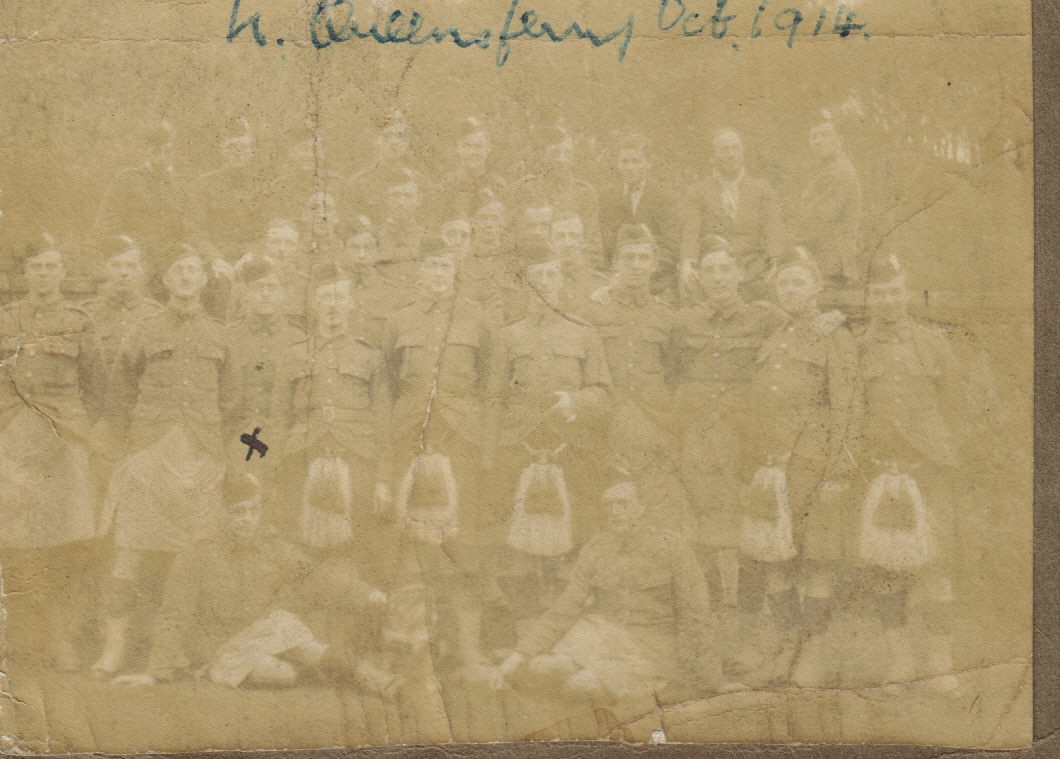
A great deal of field work was done during this period, and sham fighting among the hills and dales of Fife, on the opposite shores of the Tay, formed a big part of the training. The men took great delight in this work, and through it the acquired an experience that stood them in good stead when they came to play the game of war in earnest.
To engage in this training the companies were stationed in rotation at Wormit, under the charge of Lieut. Col. MacDowall. Here spy scares were again fairly frequent. One man made a point when put on guard of fixing the exact position of every light around. Then on his second spell he would report as suspicious a light in the offing that he had not seen there before. But all such “clues” ended up fruitlessly in a farmhouse or cottage sometime three or four miles away.
Meanwhile the spirit of impatience began to increase among the men. They wanted to be “in it” and the desire was wetted by the fact that the 4th and 5th Battalions were both in France, and had already been in heavy fighting. Would the call for the Sixth never come? They were occasionally taunted on the subject in a good humoured way.
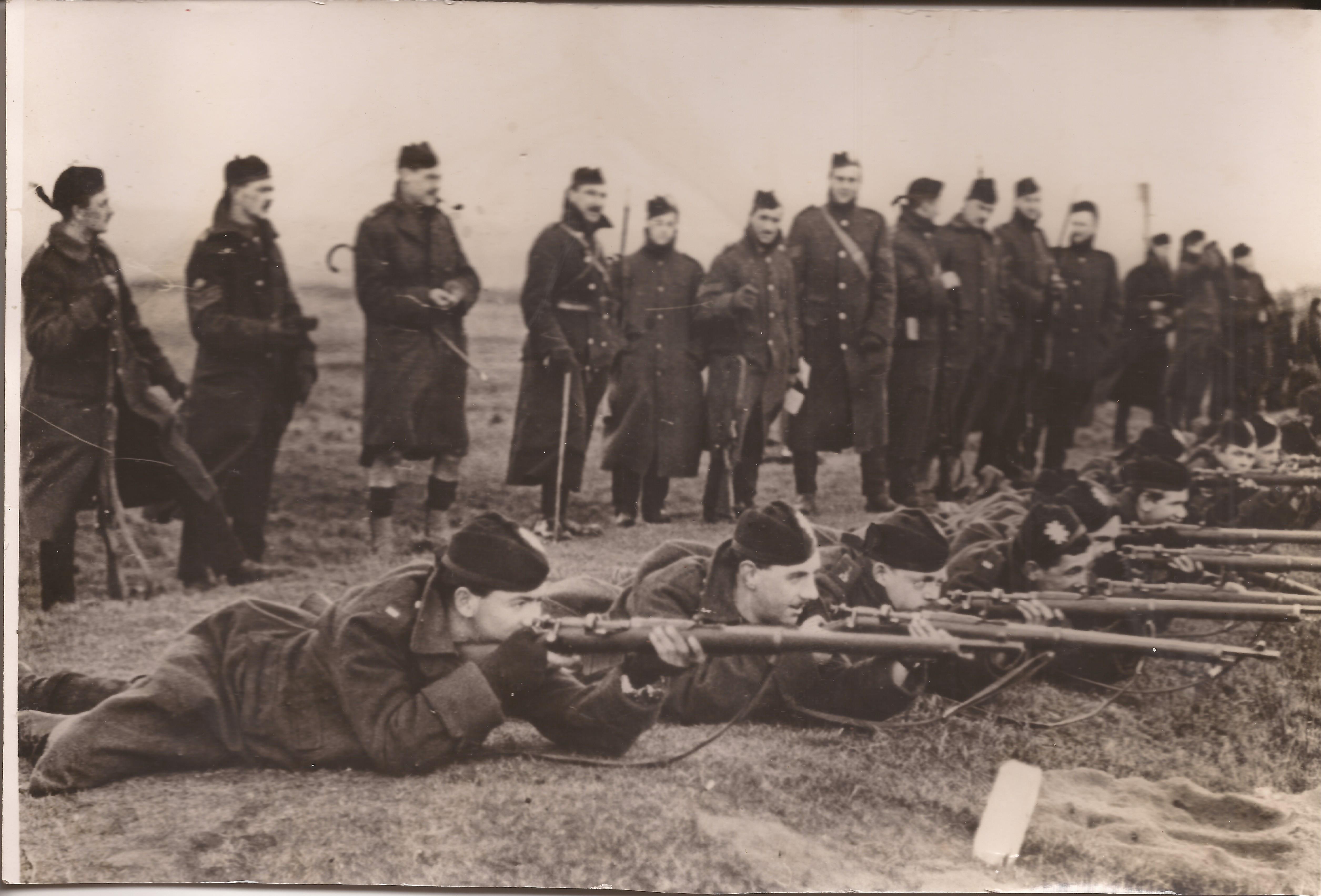
“Oh, you’ll never be there!” they were told. “You’re no’ wantid! Besides, ye’re no’ very anxious!”
Were they not? They were so anxious that they were determined to ask to be sent. With great secrecy and much whispering, a petition was drawn up and signed in the form of a huge “round robin.” This was duly presented to the Commanding Officer.
Whatever Sir Robert’s inward feelings might have been at this manifestation of the men’s keenness, he displayed only stern disapproval. The whole battalion was paraded the next morning and had to listen to some words of wholesome advice.
“You need not to be so anxious to be sent abroad,” Sir Robert concluded. “You will probably be there sooner than you expect, and then some of you may be just as anxious to get home again!”
The men were, in fact, told to be in instant readiness for the call, and orders were issued that on the blowing of a bugle every man who heard the sound, no matter where he was or what he might be doing, was at once to hasten to the barracks.
Early in January 1915, the eight company organization of the Battalion was altered to four, the rearrangement is carried out as follows;-
G and H companies became No. 1 company under Major J.Wylie.
B and D companies became No.2 company under Captain G. D. Pullar.
C and E companies became No.3 company under Captain W. Alexander.
A and F companies became No.4 company under Captain T.E. Young.

Major Wylie

Captain Pullar
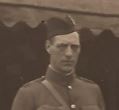
Captain Alexander

Captain Young
It was too true. At nine o’clock next morning the battalion disentrained, after a long wearisome journey. Rations had been issued at Dundee to sustain the men enroute, but the tea which was served out immediately on arrival was none the less heartily welcomed.
At Bedford the Sixth was only one battalion among many others quartered in the town. The place, in fact, was overcrowded with soldiers, and every available billet seemed to be occupied. Many of the men in consequence had to “rough it” to some extent, and were happy if they could find comfortable sleeping quarters. Often all the other space was crowded out, and it was no uncommon site to see a party seated on the pavement having dinner or tea there.
As regards the stay at Bedford, there is little to be said. New equipment was issued to the men, and from that fact they could easily deduce that they were soon to see active service. They learned that the battalion was to form part of the Highland Division, 153rd Brigade under the command of Brigadier General Douglas Campbell, which included the 5th and 7th Gordons and the 6th and 7th Black Watch.
In the matter of training, it was the easiest time the men had had since mobilization, though route marches were occasionally engaged in to get them used to their new boots. For a time blistered feet caused many of the men to go on the sick list, and there was great apprehension amongst them lest they should not get with the battalion when the every expected order came for departure. Several resorted to their old “civvy” bots, but Major Gibson watched them on the march, “spotting” and calling out of the ranks every man who had not donned the army issue.
While at Bedford, the men enjoyed some splendid concerts, got up by the local Committee and given in the Exchange. These were highly appreciated, as were all the efforts of those kindly disposed people, who took a warm interest in the welfare of the soldiers and did so much to make things pleasant for them.
As at Queensferry and Dundee, the Sixth made many friends at Bedford, and the battalion got a great send off when it left on Sunday 2nd May. This time everyone knew that it was for active service, and the destination as also common knowledge, for two days earlier the transport section had left for France.
There was the wildest delight in the ranks when the battalion paraded that Sunday afternoon and marched to the station.
Off for France
The summons came suddenly one night. It reached the men by various means. At La Scala, for instance, there was thrown on the screen the command, “All men of the 6th Black Watch report at once at the barracks”.
From every corner of the city they hastened back, hearts beating high with excitement. They were for the front, then at last! But they weren’t. Alas! It was a false alarm, intended merely to test the promptness of the response. From elation to the feelings of the disappointed ones passed to gloom and exasperation, The soldiers lot was not a happy one.
It was about the middle of April that the order to move was received at last, and amid great excitement the battalion set about making preparations. It was an open secret that, though that there might be a brief stay somewhere, the fighting line was the ultimate objective this time. But whether it would be France, or Salonika, or still further East, none could guess.
Speculation ran high, and every man was eager and happy. The start was made on 15th April, when the men said good-bye to Dundee. They had made many friends in the city, and huge crowds lined the route to the station, the battalion receiving a sendoff as cordial as that which had been accorded to “Dundee’s Own” three months before.
Dispensing many smiles and hand waves, the Sixth made their way through the cheering populace, singing their marching songs, the favourite being –
“Ta ta, my bonnie Maggie, darling, You are my guiding star.”
Varied occasionally with another, which declaimed –
“Sandy, boy, the pipes are blowing, Through you’re far from Scotia’s shore.”
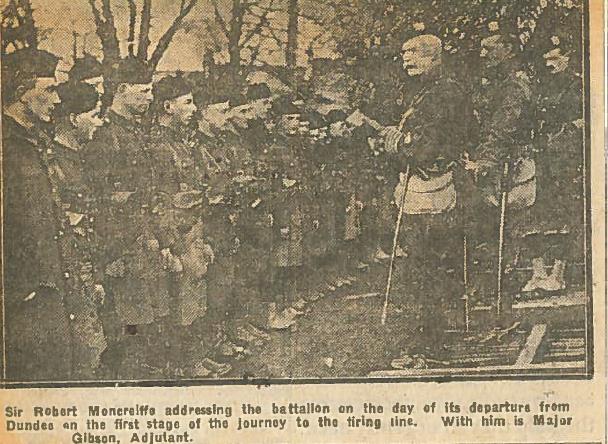
All the way to the station the hearts of the men were buoyed up with the hope that it was to be a nonstop journey to the firing line. But on the platform it was whispered around that the destination was Bedford.
It was too true. At nine o’clock next morning the battalion disentrained, after a long wearisome journey. Rations had been issued at Dundee to sustain the men enroute, but the tea which was served out immediately on arrival was none the less heartily welcomed.
